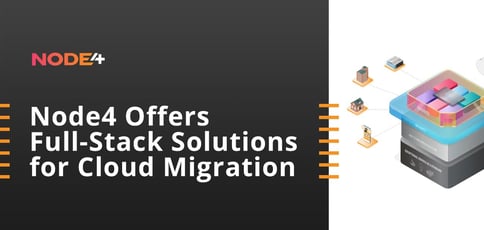
TL; DR: Node4 began as a Microsoft hosting provider in the early 2000s,but quickly expanded to cover the network connectivity space. Today, the UK-based company owns three datacenters connected via Node4’s own fiber infrastructure and linked to major telecommunications firms. The company’s suite of products comes backed by an attractive support offering. As a result, Node4 can help nearly any company maintain a hybrid or full cloud-computing presence with end-to-end tools built to reduce cost and complexity. As the company moves forward, it plans to flesh out complementary services through acquisitions and staff development.
The most successful businesses have mastered the art of the pivot.
Take Node4, for example. The company was launched as a Microsoft hosting provider operating out of a small datacenter in the early 2000s. At the time, Node4 focused primarily on Microsoft Exchange and related business applications, which did result in early success.
But the devil is in the details. And for Node4, one intricacy stood out as a major barrier to maintaining success.
“We soon realized that you’re only as good as your weakest link,” said Paul Bryce, Chief Commercial Officer of Node4. “And the weakest link in any hosting firm is often connectivity. So we decided to invest in networking and perform a bit of local loop unbundling in the United Kingdom.”

Businesses rely on Node4 to deliver mission-critical IT services and offer strategic insights around the clock.
In time, Node4 came to specialize in network connectivity — going so far that it formed connections with several British points of presence. As the hosting company became known for the speed and redundancy of its connections, more and more clients flocked to its colocation offerings, among other services.
Today, Node4 boasts a large footprint of Tier 3 datacenters. In addition to cloud servers, the company delivers a wide range of solutions, including remote work enablement, data services, and a Security-as-a-Service venture. Node4’s bundled remote and hybrid work solutions even support a distributed workforce — a bonus for enterprises struggling with pandemic-related work-from-home orders.
“We are moving further up the stack as we go along,” Paul said. “Databases are a prime example of that. We never set out to provide that service, but we wanted to stay ahead of the curve and ensure our customers have all their needs met. We want to make sure our customers get everything they need from us.”
Migration to Hybrid and Cloud Environments Needs End-to-End Services
An end-to-end provider like Node4 delivers a different set of value propositions than those offered by major public cloud providers. An entrepreneur who settles on Amazon AWS or Microsoft Azure will typically receive adequate computing resources, but trying to get personalized support is a hassle. Furthermore, public cloud pricing models don’t account for the time it takes to manage cloud infrastructure — which is sometimes more complex than expected.
“There’s a lot of buzz around public cloud adoption, with tons of people trying to move everything into the public cloud,” Paul said. “We have taken quite a few customers back from the public cloud because it didn’t work for them. In some instances, the money they thought they were going to save never materialized and their budgets got out of control.”
Node4 wraps all of its services under a single vendor relationship. For customers, the predictability of lower costs and local support proves invaluable. Node4 owns all of its UK-based servers in full, and the company trains its technical support team to meet strict SLAs while addressing the real-world problems of its customers.
The company’s broad portfolio means Node4 can loop many different technical layers into a comprehensive, single-sourced vendor relationship. That kind of vertical integration makes for a smoother service offering. For example, the tech team knows how to go from bare metal to fully deployed server clusters layered with a Microsoft 365 subscription or a VoIP telecom platform.
“When you talk to our customers, they say that the things that they like about Node4 include our responsiveness and flexibility in terms of approach,” Paul said.
Cloud Transition Requires Software, Hardware, and Connectivity
A proper end-to-end cloud solution places the right software atop optimized hardware. It also features fast network connectivity, allowing software to run seamlessly on each client computer. As any good host knows, all components of the cloud solution must be reliable, scalable, and fine-tuned for any given application.
On the hardware front, Node4 runs Tier 3 datacenters located in the English cities of Derby, Leeds, and Northampton. The company designed each facility to support several high-level disaster recovery strategies and meet cooling, power, and server resiliency specifications. Each datacenter also supports a large number of server racks.

Node4 is committed to delivering attentive and knowledgeable customer support.
The company’s three datacenters connect to each other and to major telco operators through Node4’s Multiprotocol Label Switching (MPLS). The network uses a Dense Wavelength Division Multiplexing (DWDM) backbone running on Node4’s own dark fiber, which means the MPLS core can scale bandwidth easily and with low latency. (The network is fully managed with a backbone that offers up to 320 Gbps.)
The robust software powering Node4’s product portfolio rests on its N4 Cloud platform. This cloud system was designed by Node4 using Cisco hardware, VMware vSphere hypervisors, and NetApp storage. Node4 is one of the few companies certified as a Cisco Master Service Provider for cloud and managed services. The company’s relationship with Cisco also extends to Node4’s own collaboration platform, leveraging Cisco’s SIPconnect framework to deliver powerful VoIP and videoconferencing tools.
In addition to this unique blend of hardware, software, and connectivity, Node4 consults clients on several topics. These include digital transformation, IT strategy, and managed services.
Delivering Cloud-Led Digital Transformation Solutions
Cloud computing is a buzzworthy business trend for good reason, but the migrations that enable digital transformations aren’t always seamless. Providers tend to sell different cloud-computing models of varying cost and complexity in packages that sometimes confuse businesses. Node4’s approach, on the other hand, emphasizes connectivity and customer support. This helps companies in the UK obtain local cloud services in a true end-to-end fashion.
Node4 can solve complex business needs in-house because it owns and manages its own datacenters, software platforms, and connectivity framework. The flexibility inherent in such a system helps the company’s support team wrap complex arrangements of servers and consulting services into simple, accessible end user packages.
“Cloud-led digital transformation is at the core of what we do,” Paul said. “But lots of people do that. We stand out through a heavy focus on the customer experience. We want to make exceptional service the standard within our company.”
Node4’s near-term road map focuses on strategic corporate acquisitions meant to satisfy specialized customer needs within a broad constellation of offerings. Paul notes that the company has been deliberate in its merger and acquisition strategy — and will likely aim for other complementary acquisitions. The ultimate goal is to promote growth while broadening Node4’s offerings in terms of skills and geography.
For Paul, partnership serves as the core value proposition offered by Node4.
“Gone are the days of a supplier-type relationship,” he said. “We tend to walk away from any customer who tries to treat us as a more traditional supplier. We’re instrumental in the lifeblood of any business — and our actions can make or break a business. We take that seriously. We want the customer to recognize that we are their partners, and we aim to deliver technology that presents them with real business benefits.”
HostingAdvice.com is a free online resource that offers valuable content and comparison services to users. To keep this resource 100% free, we receive compensation from many of the offers listed on the site. Along with key review factors, this compensation may impact how and where products appear across the site (including, for example, the order in which they appear). HostingAdvice.com does not include the entire universe of available offers. Editorial opinions expressed on the site are strictly our own and are not provided, endorsed, or approved by advertisers.
Our site is committed to publishing independent, accurate content guided by strict editorial guidelines. Before articles and reviews are published on our site, they undergo a thorough review process performed by a team of independent editors and subject-matter experts to ensure the content’s accuracy, timeliness, and impartiality. Our editorial team is separate and independent of our site’s advertisers, and the opinions they express on our site are their own. To read more about our team members and their editorial backgrounds, please visit our site’s About page.

